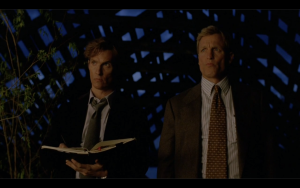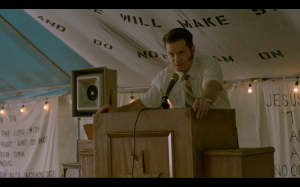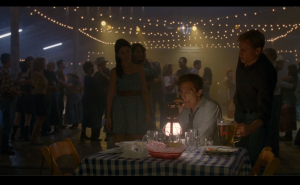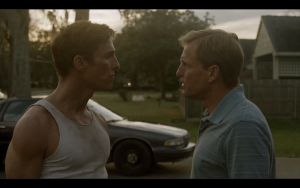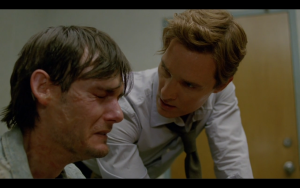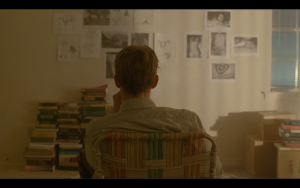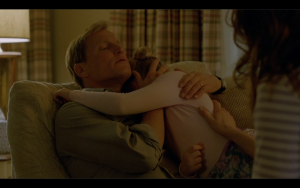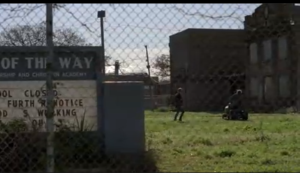Season 1, Episode 3: “THE LOCKED ROOM”
1995
“The Locked Room” picks up right where “Seeing Things” left off…with Rust, Cohle, and a team of criminologists investigating the mural upon the Church wall. This transitions to the two detectives listening to preacher Joel Thierot in the midst of a rousing speech to his congregation. Upon observing this crowd, Rust makes a series of critical remarks toward religion and its followers that prompts a number of small arguments back from Marty. Afterward, the two question the churchgoers to find that Dora was often seen accompanied by a tall man. During a quick meal break following the Church scene, Marty further accuses Rust of being too obsessive, which prompts Rust’s own derisive remarks toward Marty’s work ethic.
On a day off, Rust is found talking with Maggie in Marty’s living room. The latter arrives home to find his lawn cut and Rust alone with his family—causing a tense confrontation between the two partners afterwards. That night, Marty questions his daughter Audrey about her sexually explicit drawings—though Maggie can tell that Marty is more interested in the game on the television than his daughter’s mental well-being. In their bedroom afterward, the couple remains at odds: with Maggie question everything about Marty’s attitude as of late.
Soon after, Rust’s incredible skill with suspects inside “the box” is demonstrated. The detective is able to deftly probe possibly witnesses for guilt—eliciting impressed remarks all around from Marty and the 2012 detectives when reviewing his assist records. Moreover, Rust’s insomnia and obsessive nature is given further presentation as he combs over countless boxes of dead bodies looking for some clue as to link the Dora Lange murder with a previous body.
However, his meticulous investigating is cut-short by needing to attend to a date arranged by Marty and Maggie. At this dinner, Marty spots Lisa on a date with another man and signals for her to meet him at the bar. There, the two discuss their relationship status—with Lisa vowing that it is over. Meanwhile, Rust explains his synesthesia to his date.
Afterward, Marty drunkenly drives to Lisa’s apartment and beats the living hell out of her date—Marty flashing his badge and threatening his police power throughout the ordeal. That same night, Rust remains alone in his solitary room—studying evidence and chain-smoking cigarettes until he receives a call from Maggie. Marty’s wife remains suspicious of her husband’s whereabouts, though Rust pleads ignorance.
The next morning, Rust uncovers a break in the case in the death of Rianne Olivier. What was previously thought to be a case of a flood-drowning victim reveals the mark of the King on the small of her neck—just like Dora Lange. On the ride to question Rianne’s grandfather, Marty expresses doubts as to his morals as a “good man”—prompting Rust’s “the world needs bad men…we keep the other bad men from the door” line. Upon meeting the grandfather, they learn of Rianne’s boyfriend—Reginald Ledoux. They also learn of her attendance at Light of the Way School—a Tuttle Family Foundation School—while also acquiring her box of personal effects.
When the detectives move to investigate the school, they encounter “the lawnmower man” and learn of the school’s closing down in ’92. They then soon learn of Reggie Ledoux’s statuary rape complaints and his bust in connection with a meth lab, where, during prison, he was learned to be cellmates with Charlie Lange. The episode’s final shot includes a haunting last shot of Ledoux—clad in a gas mask, underwear, and wielding a machete.
2012
Marty’s interview mostly concerns further support toward Rust’s skills as an investigator—his success as a “box man” and his eye for detail. However, his compliments about Rust’s skills are juxtaposed against his excuse that the other detectives had “families”, “boundaries”, and “responsibilities” that kept them occupied instead—these explanations often cut against Marty’s infidelities with Lisa or his disinterest in parenting his troubled daughter.
Meanwhile, Rust’s interviews shed further light on how much his obsessive detective work warped his viewpoint of human life. Hours and hours of staring at dead bodies being xeroxed at late-night hours in the police department have seemingly removed Rust’s sense of empathy for any hope of individual meaning. He speaks in great lengths about the fallacies of religion, of hope, of individual identity, of memories, of dreams—all of these various philosophical points embodied within the idea of the dream within a “locked room” that is the human mind and gives the episode its title.
————————————————————————————————————————-
(Spoilers All)
REVIEW
Though “Locked Room” still contains some of the show’s most memorable characters bits, it is also a “chess piece” episode—in that it’s mostly focused on shifting certain plot elements to move the story forward more than anything else. Nonetheless, like the show does best, even these small bits are mostly disguised through further character treatment and greater glimpses into the interior of the two detectives’ lives.
The early scene with Joel Thierot’s church allows for some of Rust’s most famous lines in his criticism of religion and its churchgoers. Though Marty predictably bites back at many of these jibes (Rust: “What do you think the average IQ of this group is, huh?” Marty: “can you see Texas up there on your high horse?”), the former’s does speak toward aspects of human nature and religion that allow insight into his view on religion’s role as it relates to storytelling:
“Transference of fear and self-loathing to an authoritarian vessel—it’s catharsis. He absorbs their dread with his narrative, because of this, he’s effective in proportion to the amount of certainty he can project”. And morals: “if the only thing keep a person decent is the expectation of divine reward, then brother, that person is a piece of shit…”
As those religious leaders of the police and state (Billy Lee Tuttle, his Light of the Way Schools) are found to be responsible for the crimes against the children, Rust’s judgments actually contain more narrative relevance than many reviewers were quick to point out in the episode’s initial debut. There’s even a very quick line from Joel Thierot when questioned on his background, where he states: “I came up under Billy Lee Tuttle and went to his college up in Baton Rouge a couple years.”
These ’95 discussions of religion transition to Rust’s interview with Papania and Gilbough, where Rust’s ramblings focus on much larger existential ideas of purpose and meaning. Though his monologues remain adamant about the futility of expecting any sense of closure, one particular line deserves especial attention for its eventual comeuppance in the finale:
“The ontological fallacy of expecting a light at the end of the tunnel, well, that’s what the preacher sells…and then he tells you it’s a fuckin’ virtue…and it’s such a desperate sense of entitlement, isn’t it…surely this is all for me.” During Rust’s glimpse into the void—a literal light at the end of the tunnel when battling Errol Childress in Carcosa—he experiences a feeling of fulfillment and personal meaning that is indeed specific to him when feeling the love and presence of his daughter.
The rest of Rust’s storyline further demonstrates his detective skills for all its positives and negatives. His late-night hours spent combing through old case files looking for a previous corpse that may attributed to the Yellow King lead to his finding Rianne Olivier—a fellow Light of the Way Student and boyfriend of Reggie Ledoux—a huge crack in the case that comes at the cost of his insomnia and a numbness toward life and death that he credits in part to the hundreds of hours spent staring at dead bodies and considering their ultimate fate.
“I have seen the finale of thousands of lives man…young, old…each one is so sure of their realness…that their sensory experience constituted a unique individual with purpose, meaning…so certain that they were more than a biological puppet…the truth wills out and everybody sees, once the strings are cut, all fall down.”
Moreover, his skills as a “box man”—a detective able to ascertain a suspect’s guilt or confession in a crime is given demonstration. When interviewing various suspects with facial scarring, Rust is able to perform a very theatric form of questioning and coercion to allow for the subject to finally open up after Rust is able to tear down the barrier holding them back. When questioned by Papania and Gilbough, Rust states: “I never been in the room more than ten minutes, I didn’t know whether the guy did it or not…how long does it take you?”
A clear jab at the fact that Rust has clearly been in the room with the two detectives for longer than ten minutes, as they continue to consider whether Rust may responsible for the new Lake Charles murder with possible ties to Dora Lange. This is further solidified when Rust remarks: “But then again I’m terrible with cards” in talking about being able to call a suspect’s bluff. The remark deserves attention for the fact that Rust is bluffing his way through this interview with Papania and Gilbough now—both in using the interview to find out information on the Lake Charles murder that he’s not able to ascertain from the inside—and in this whole drunken/drinking charade that will make anything said during his interview inadmissible.
Meanwhile, Marty’s storyline mostly focuses on his hypocritical nature that led to his downfall more than anything else. Repeatedly, he criticizes Rust’s methodology and obsessive nature only to contradict his values in favor of his more impulsive pursuits. A scene after their visiting the Church states this more explicitly when Marty tells Rust: “You have a tendency toward myopia…tunnel vision…your obsessive.” To which Rust replies: “You’re obsessive too, just not about the job.
This is perhaps best demonstrated through Marty’s hypocritical failures as a “family man”. When he and Maggie confront Audrey about her sexually explicit drawings, Marty does so while keeping his eyes trained on the basketball game on the TV, rather than focusing on his daughter’s words and emotions. Maggie notices and calls him out on his recent nature of continuing to separate himself from the family. She tells Marty that Audrey is continually withdrawn and asking why her father is working so much, to which Marty blames his working on the case, when, as the audience has seen, it is more due to his time spent with his mistress or drinking with fellow policeman.
Marty’s interview with Papania and Gilbough further highlights this hypocritical nature within him (especially in relation to Rust). Marty tells the two interrogating detectives such lines as: “You know what it means to be a father? It means you are accountable for other people. You are responsible for their lives…People give you rules. Rules describe the shape of things”. These lines from 2012 often transition to his actions in ’95, when he is intimidating his mistress at the same family function that he has brought his wife. Or later, during the “people give you rules” line, when he trespasses into Lisa’s apartment and beats up her date—abusing his power as a detective and reminding Lisa and her date about his status as a detective throughout the ordeal.
Marty later expresses some moral compunction about his actions with lines like: “I really wouldn’t have done something like that…I’m not a psycho”. Or when he later asks Rust: “do you wonder ever…if you’re a bad man?” More than anything else, these are statements that exemplify Marty’s absolute doubt in himself: as a man and as a detective. When Maggie is talking with Rust on the phone later, asking why he (and men) don’t give things chances, Rust explains: “Because we know we want. And don’t mind being alone”. This is cleary the opposite of Marty—someone unsure of who we wants and incapable of being alone—as will be later demonstrated following his separation from Maggie in future episodes.
Lastly, as always, a few more clues toward the identity of the Yellow King are revealed. In truth, as those who have seen the season are aware, the Lawnmower Man that Rust meet in this episode will be revealed to be the killer of their pursuit. There’s a great Easter Egg that hints toward this fact seen in the following shot, where the words “NOTICE KING” are visible upon the board on the right hand side of the dividing post.
The ominous connection between Tuttle, the Light of the Way School, and the murders/disappearances in between are startingly obvious in hindsight—from Tuttle’s creation of the Task Force, to Rianne having gone to the Light of the Way school under Tuttle’s foundation, to Joel Thierot’s mentioning that he went to Tuttle’s college—but these are all pieces of evidences to be linked at a later date…after Rust and Marty have first dealt with Charlie Ledoux—the gas-mask wearing and machete wielding monster—who is first glimpsed at the end of the episode.
